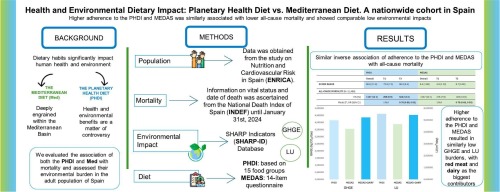Author links open overlay panelMaría del Carmen Aznar de la Riera a, Rosario Ortolá a b, Stefanos N. Kales d, Auxiliadora Graciani a, Jesús Diaz-Gutierrez e, José R. Banegas a b, Fernando Rodríguez-Artalejo a b c, Mercedes Sotos-Prieto a b c dShow morehttps://doi.org/10.1016/j.scitotenv.2025.178924Get rights and contentHighlights•
The PHDI and the Med have shown to similarly reduce all-cause mortality risk.
•
Similar reduced GHGE and LU result from adhering to these plant-based diets.
•
Traditional diets like the Med already support health and environmental benefits.
•
Each population’s customs are key when assessing health and environmental impacts.
AbstractBackground
Plant-based diets, such as the Planetary Health Diet (PHDI) and the Mediterranean Diet (Med), offer notable advantages for human and planetary health. However, knowledge on the PHDI’s benefits is limited, particularly in Southern European countries where the Med is culturally rooted and is an environmentally sustainable dietary pattern.
Objective
to evaluate the association of both PHDI and Med with mortality and assess their environmental burden in the adult population of Spain.
Methods
Data were taken from the study on Nutrition and Cardiovascular Risk in Spain (ENRICA) comprising 13,105 participants representative of the Spanish adult population. The PHDI score (0–140 points) was based on 15 food groups, while adherence to Med was assessed with the 14-item MEDAS score (0–14 points). Environmental impact was assessed using the SHARP-ID database (including greenhouse gas emissions and land use). Analyses were performed with Cox regression and adjusted for main confounders.
Results
During a mean 14.4-year follow-up, 1157 all-cause deaths occurred. The mortality hazard ratio (95 % CI) for the highest vs lowest tertile of the PHDI score was 0.78 (0.66, 0.91) but reached a plateau level at 90 points of PHDI. For the MEDAS, the corresponding results for the highest vs lowest tertile was 0.79 (0.68, 0.93) with a continuous inverse dose-response association. Adherence to some components of the PHDI (fruits, dairy, and unsaturated oils) and of MEDAS (nuts, and low consumption of soda and pastries) was independently and significantly associated with lower mortality. Results remained robust in sensitivity analyses. In terms of environmental impact, both plant-based diets had similar low footprints, with dairy and meat products being the largest contributors.
Conclusion
In this large cohort of Spanish adults, higher adherence to the PHDI and MEDAS was similarly associated with lower all-cause mortality and showed comparable low environmental impact.
Keywords
Planetary health diet
Mediterranean diet
Plant-based diet
Environment
Environmental health
Non-communicable diseases
Recommended articles
Data availabilityData will be made available on request. Further information including the procedures to obtain and access data from the Study on Nutrition and Cardiovascular Risk in Spain (ENRICA) can be found at: https://www.maelstrom-research.org/study/enrica
© 2025 The Authors. Published by Elsevier B.V.


Dining and Cooking